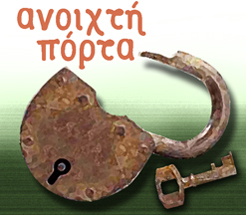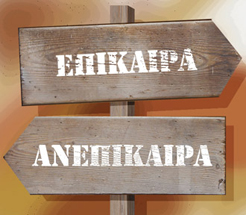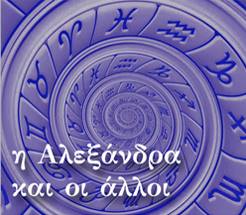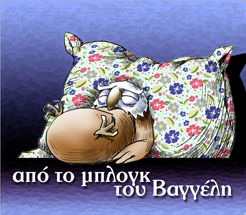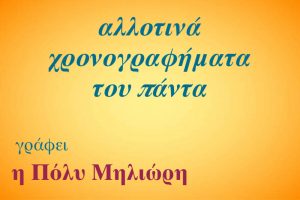
Δεν είναι περίεργο που στην ιστορία της Ρόδου ο Ιούνιος ήταν ο μήνας που διάλεγαν οι εχθροί για να τις επιτεθούν. Παραδοσιακά, πόλεμοι και εκστρατίες γινόντουσαν καλοκαίρι και δείτε παρακαλώ τι έπαθαν Ναπολέων και Χίτλερ που πήγαν χειμώνα στην Ρωσία.
Ιούνιος 1480 και η Ρόδος πολιορκείται. Λέει ο Καουρσέν πως όλο τον Ιούνιο, μέρα και νύχτα οι ουρανοί βρέχουν πέτρινες μπάλες. Kανείς δεν είχε ξαναδεί κανόνια σαν τα Tούρκικα. Λένε πως ο αχός του βομβαρδισμού ακουγόταν στην Kώ και στο Καστελόριζο, 60 μίλια μακριά. Kανείς δεν έμενε πια στο σπίτι του. Yπόγεια, κατακόμβες, στέρνες έγιναν τόποι διαμονής των κατοίκων.
Ο Πύργος του Άγιου Νικόλα είναι πρωταρχικός στόχος των Τούρκων. Αν πέσει θα ανοίξει ο δρόμος για τα σχετικά αδύναμα τείχη της θάλασσας. Αφού δεν τα κατάφερναν με τον βομβαρδισμό σοφίζονται λοιπόν οι Τούρκοι μηχανή:
Έφτιαξαν με ξύλα και βαρέλια μια πλωτή γέφυρα. Tον κάβο που ‘ταν στην άκρη της τον πέρασαν από τον κρίκο μιας άγκυρας μπηγμένης κρυφά κάτω από τη θάλασσα, στα βράχια του Aη Νικόλα. Tραβώντας τώρα τον κάβο από την απέναντι ακτή -εκεί που τώρα είναι ο N.O.P.- η γέφυρα πλησίασε τον πύργο. Έξυπνο, ε; Για μια στιγμή φάνηκε πως ο πύργος θα ‘πεφτε. Tη νύχτα όμως, λένε τα χρονικά του Tάγματος, ένας Άγγλος ναύτης βούτηξε στα νερά κι έκοψε τον κάβο. Η ιστορία είχε την καλοσύνη να μας αφήσει το όνομά του: Roger Jervis. Παρασυρμένη από το ρεύμα και κάτω από τα πυρά και τα χάχανα από τα τείχη, η γέφυρα ξανοίχτηκε στο πέλαγος μ’ όσους Tούρκους έτυχε να βρίσκονται πάνω της.
Μα οι Τούρκοι δεν το βάζουν κάτω. Tην νύχτα της 18ης προς την 19η Iουνίου 1480, με κραυγές και τυμπανοκρουσίες οι Oθωμανικές ορδές ορμούν στα βράχια του Aη Nικόλα. Παρ’ όλο ότι είναι προετοιμασμένοι, οι υπερασπιστές δεν μπορούν να αποτρέψουν την απόβαση. Tο τι έγινε πάνω σ’ εκείνους τους βράχους και τα τείχη δεν περιγράφεται! Αρκεί να πούμε πως, σώμα με σώμα, πολεμούσαν οι καλύτεροι στρατοί της εποχής. Πρώτος και καλύτερος με την σπάθα στο χέρι, ο Μέγας Mάγιστρος ντ’ Ωμπουσόν. Στο πλευρό του, ο φρούραρχος και μετέπειτα Μέγας Μάγιστρος ντελ Kαρέτο.
Όταν πια ξημέρωσε οι Τούρκοι είχαν αποσυρθεί. Ψηλά από τα κάστρα οι Ροδίτες που είχαν ξενυχτήσει έβλεπαν την θάλασσα σπαρμένη με τα λείψανα της φοβερής μάχης… ναυάγια κάθε λογής, όπλα, σαρίκια κι ανάμεσά τους πτώματα χρυσοντυμένα, με αστραφτερά άρματα. Σε μια νύχτα είχαν χαθεί 2500 Τούρκοι, ανάμεσά τους κι ένας από τους αγαπημένους γαμπρούς του Σουλτάν Μεχμέτ του Πορθητή.
Ο Μέγας Μάγιστρος Θα εκφράσει δημόσια τον θαυμασμό “για τους ιππότες, τους Λατίνους και τους Έλληνές του”. Το θάρρος τους, λέει, υπενθύμισε στον κόσμο πως η Ρόδος ήταν ένα ασφαλές λιμάνι για όλους τους Χριστιανούς.
Από το βιβλίο μου “Ρόδος 1306-1522, μια Ιστορία”.

It is not strange that in the history of Rhodes June was a month her enemies chose to attack. Traditionally, wars and campaigns took place in the summer -see what happened to Napoleon and Hitler that went to Russia in the winter.
June 1480. Rhodes is under siege and as the historian Caoursin says the sky is raining balls of stone day and night. No one has seen the likes of the Turkish cannons before. They say that the noise of the bombardment could be heard in Kos and Castellorizo , 60 miles away. Nobody is staying at home anymore. Basements , catacombs , even cisterns , and granaries become makeshift residences for the people.
The fort of St. Nicholas at the entrance of the harbor is a prime target. If it falls it will open the way to the comparatively weaker walls of the seaside. Failing to assault the fort the Turks come up with a new scheme. With boards and barrels , they fashioned a pontoon bridge with a line fixed at one end. The line was dropped into the water and guided through the ring of an anchor that had been secretly secured on the rocks around the fort. By pulling this line from the opposite shore- where N.O.R. is today- the platform would stop at the rocks , and the troops would then jump on shore. Tricky , isn’ t it? For awhile it looks like the fort does n’ t have a chance. But on the night of June 17, just before the operation was launched- according to the chronicle of the Order- an English sailor dives in the water unobserved and severs the line. Set free and carried by the currents , the bridge drifts away from shore toward the open sea with all the troops that happened to be on it , under the fire- and jeers- of the home team. To reward the brave diver , history has preserved his name: ROGER JERVIS.
But the Turks don’t give up. On the night of the 18th to the 19th of June 1480 , with drums and battle cries , throngs of Ottomans are discharged on the rocks of the Fort of St. Nicholas. In spite of their preparedness , the defenders cannot quite repel the landing.
What happened on those rocks and on the walls above , or their remains , cannot be decently described. Suffice it to say that the best fighting armies of the time clashed in hand to hand combat. First and foremost , sword in hand , fights Grand Master d’ Aubusson. By his side is Commander of the Fort and future Grand Master Fabrizzio dell Carretto.
Finally , at dawn, June 19, the Turks withdraw. From up above , in their towers and ramparts , the Rhodians are staring at the sea , strewn with the grim remains of the battle: Every kind of shipwreck , weapons , turbans and corpses in gilded uniforms and shining gear. For many days afterward the sea washes out on the beaches of Rhodes the bodies of her would- be molesters. In one night , 2,500 Turks have been lost , and among them one of Sultan Mehmet’ s favorite sons in law.
The Grand Master publicly declares his admiration for “his knights , his Latins and his Greeks”. Their courage , he says , reminded the world that Rhodes was a safe haven for all Christians.
From my book “Rhodes 1306-1522, a Story”.
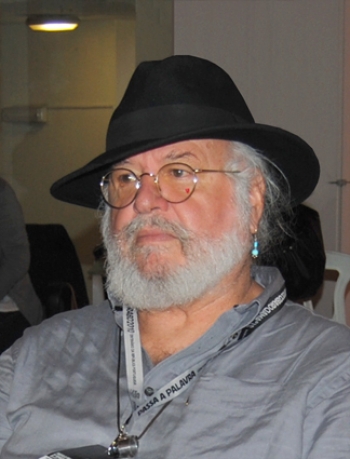
η σελίδα του



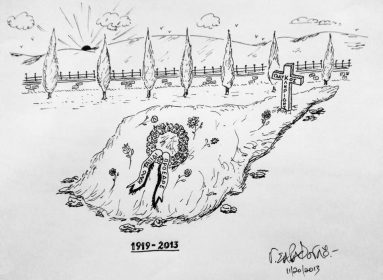

















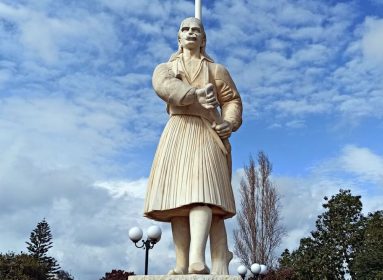
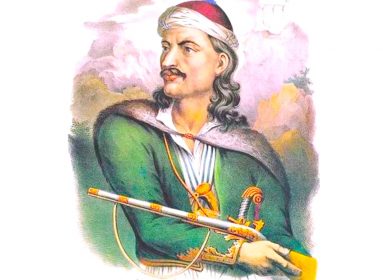

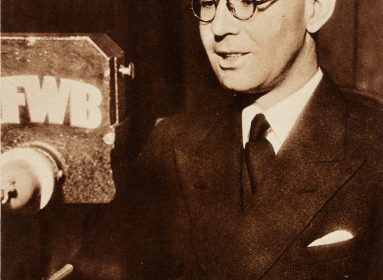
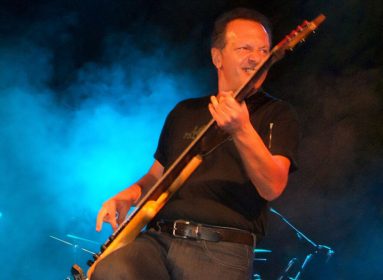


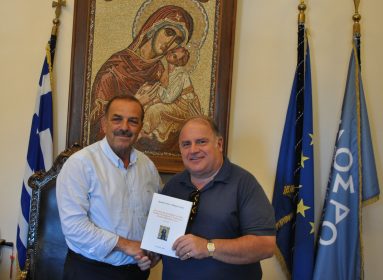
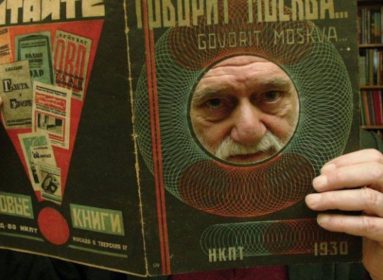
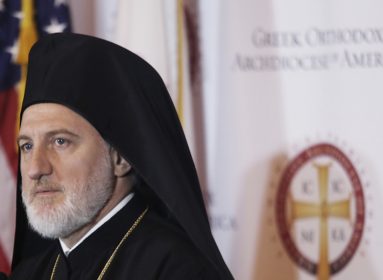
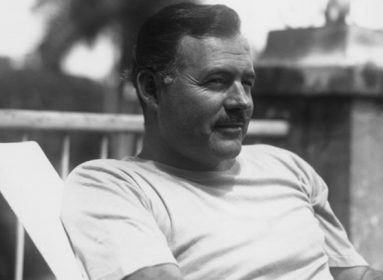









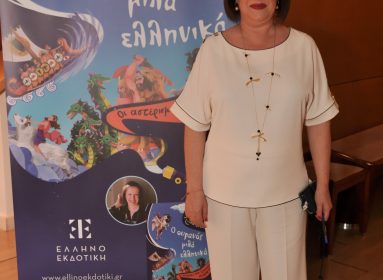


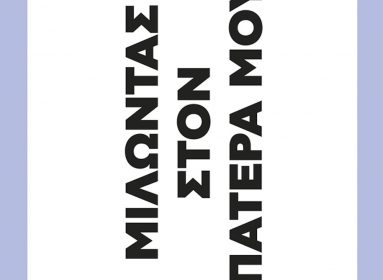

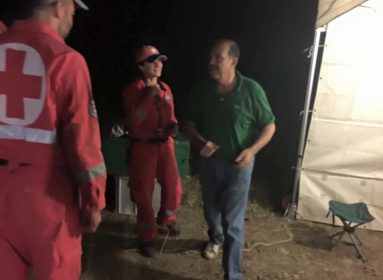




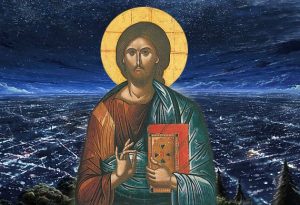

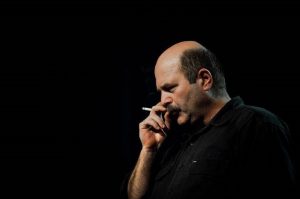

 Στηρίξτε-Ενισχύστε την iΠόρτα με τη δική σας χορηγία…
Στηρίξτε-Ενισχύστε την iΠόρτα με τη δική σας χορηγία… Το σκίτσο είναι του Βαγγέλη Παυλίδη
Το σκίτσο είναι του Βαγγέλη Παυλίδη
